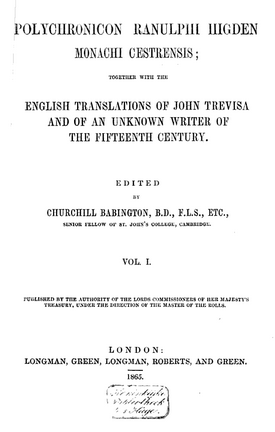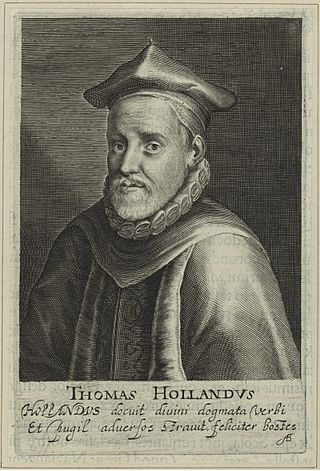
The King James Version (KJV), also the King James Bible (KJB) and the Authorized Version (AV), is an Early Modern English translation of the Christian Bible for the Church of England, which was commissioned in 1604 and published in 1611, by sponsorship of King James VI and I. The 80 books of the King James Version include 39 books of the Old Testament, 14 books of Apocrypha, and the 27 books of the New Testament.

Lancelot Andrewes was an English bishop and scholar, who held high positions in the Church of England during the reigns of Elizabeth I and James I. During the latter's reign, Andrewes served successively as Bishop of Chichester, of Ely, and of Winchester and oversaw the translation of the King James Version of the Bible. In the Church of England he is commemorated on 25 September with a lesser festival.

William Tyndale was an English Biblical scholar and linguist who became a leading figure in the Protestant Reformation in the years leading up to his execution. He is well known as a translator of much of the Bible into English, and was influenced by the works of prominent Protestant Reformers such as Martin Luther.
Partial Bible translations into languages of the English people can be traced back to the late 7th century, including translations into Old and Middle English. More than 100 complete translations into English have been produced. A number of translations have been prepared of parts of the Bible, some deliberately limited to certain books and some projects that have been abandoned before the planned completion.

The Douay–Rheims Bible, also known as the Douay–Rheims Version, Rheims–Douai Bible or Douai Bible, and abbreviated as D–R, DRB, and DRV, is a translation of the Bible from the Latin Vulgate into English made by members of the English College, Douai, in the service of the Catholic Church. The New Testament portion was published in Reims, France, in 1582, in one volume with extensive commentary and notes. The Old Testament portion was published in two volumes twenty-seven years later in 1609 and 1610 by the University of Douai. The first volume, covering Genesis to Job, was published in 1609; the second, covering the Book of Psalms to 2 Maccabees plus the three apocryphal books of the Vulgate appendix following the Old Testament, was published in 1610. Marginal notes took up the bulk of the volumes and offered insights on issues of translation, and on the Hebrew and Greek source texts of the Vulgate.

Modern English Bible translations consists of English Bible translations developed and published throughout the late modern period to the present.

John Trevisa was a Cornish writer and professional translator.

John Overall (1559–1619) was the 38th bishop of the see of Norwich from 1618 until his death one year later. He had previously served as Bishop of Coventry and Lichfield, as Dean of St Paul's Cathedral from 1601, as Master of Catharine Hall from 1598, and as Regius Professor of Divinity at Cambridge University from 1596. He also served on the Court of High Commission and as a Translator of the King James Version of the Bible.
John Layfield was an English scholar and Bible translator.
Robert Tighe was an English cleric and linguist.
Richard Thomson, sometimes spelled Thompson, was a Dutch-born English theologian and translator. He was Fellow of Clare Hall, Cambridge and the translator of Martial's epigrams and among the "First Westminster Company" charged by James I of England with the translation of the first 12 books of the King James Version of the Bible. He was also known for his intemperance and his doctrinal belief in Arminianism.
Roger Andrewes was an English churchman and academic, archdeacon and Chancellor at Chichester Cathedral in the English Church. He was also a scholar, a Fellow of Pembroke Hall and was, in 1618, made Master of Jesus College, Cambridge.
Robert Spaulding was an English scholar, Fellow of St John's College, Cambridge and one of the translators, in the "First Cambridge Company", of the King James Version of the Bible. The company translated from 1 Chronicles to the Song of Solomon. He succeeded Edward Lively as Regius Professor of Hebrew at Cambridge.
Francis Dillingham was an English Protestant scholar, cleric and Bible translator.

Thomas Holland was an English Calvinist scholar and theologian, and one of the translators of the King James Version of the Bible.
John Duport was an English scholar and translator.

William Branthwaite (1563–1619) was an English scholar and translator.
John Bois was an English scholar, remembered mainly as one of the members of the translating committee for the Authorized Version of the Bible.
Geoffrey King was an English Protestant theologian, a Fellow and Regius Professor of Hebrew at King's College, Cambridge. He was among the First Westminster Company charged by James I of England with the translation of the first 12 books of the King James Version of the Bible.
Roger Fenton (1565–1615) was an English clergyman, one of the translators of the Authorised King James Version.







